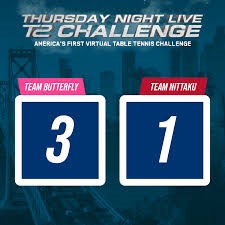Over the last month, we sports fans have gotten a little spoiled. With so many sporting events resuming in some form or another, one could almost pretend that life was returning to normal. Of course, it isn't — no time soon, anyway. In lieu of normality, however, USA Table Tennis has teamed up with the T2 Asia-Pacific Table Tennis League to offer "America's first virtual table tennis challenge." Thus, for the last four weeks, we have had the pleasure of watching live table tennis in prime time on the "Thursday Night Live: T2 Challenge." T2 features a unique scoring system designed for a fast pace and maximum drama. The "virtual" teams are formed when the loser of each week's matchup between top US players picks a teammate from the following week's match. Each team is sponsored by a major table tennis manufacturer, hence Team Nittaku and Team Butterfly. While there is prize money for each individual match, the overall competitive structure is a race to 6 between the two teams. After 4 weeks of weekly matches in the newly expanded Westchester Table Tennis Center, Team Butterfly has jumped out to a commanding 3-1 lead. Last week, Team Nittaku's Wu Yue avoided the shutout when she bested Tahl Leibovitz. Next week, the action shifts to Houston. The drama for this week, then, comes from watching Tahl Leibovitz choose between Katherine (Huijing) Wang and Michael Minh Tran. Wang, 40, is a penholder ranked #913 in the women's world rankings. She qualified for the 2020 Olympics with a stellar performance at the Olympic trials in February and March. For his part, 17-year-old Tran is a shakehand player ranked #927 among the gentlemen of the world. While Leibovitz was torn between the two talented Texans, he ultimately settled on the key distinction between the two players. "I notice that when Michael Tran is playing, after each point... he makes a judgment about the point," reasons Leibovitz. So if it's going really well for him, he makes a positive judgment. If it doesn't go as well, he makes a negative judgment. Huijing, on the other hand, she doesn't really make any judgment, negative or positive, when she's playing. She's super strong mentally... I think she has the edge, mentally." While she usually keeps her cards close to her chest, Wang offered a glimpse into her mindset during competition. "As a professional player, I learned to focus on the process — every point — instead of thinking of the result," says the Olympian. The results are in: Staying in the moment leads to more momentous moments. Tune in next week to see how it all shakes out!
More at USATT
